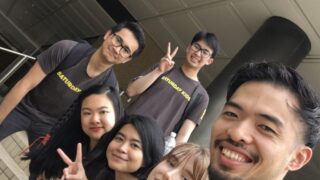Leading High Performing Remote Teams
How can leaders ensure that performance remains high in remote or hybrid-work environments?
Content Marketing
In this course, you’ll learn how compelling blogs, videos, podcasts, and other media can reach customers and drive sales. You’ll also learn steps for creating an effective content marketing plan, and some important ways to measure its impact and success.
Content marketing is a essential digital marketing strategy for companies looking to provide relevant and useful information to support your community and attract new customers.
Get started on your content marketing journey today.
Sustainable Innovation in Times of Disruption: Choices for a Better Society
There are opportunities for progress all around us. The key is to innovate on these opportunities sustainably.
To help identify most effective path forward, you'll need to gain a global perspective to these challenges in an open discussion. How can Japan and the world take action to create a more sustainable, innovative world? Where do you fit in?
It's time to find out.
Social Media & Digital Communications: Impact on Global Public Opinion
Social and digital media have dominated the communications industry for decades. But it's no secret that social media has the power to sway public opinion, and the way in which many companies use these platforms could be seen as manipulative.
What do companies need to be aware of when utilizing social and digital media? How can these mediums be used to better communicate strategically with the world?
Discover what top media and communications experts have to say.
CAGE Distance Framework
Want to expand overseas? The CAGE distance framework can help ensure you're constructing a solid global strategy in four areas: cultural, administrative, economic, and geographic. Learn how to leverage useful differences between countries, identify potential obstacles, and achieve global business success.
Servant Leadership
There's more to leadership than driving a team to profit. In fact, there's a word for looking beyond self-interest to prioritize individual growth: servant leadership. Try this course for a quick breakdown of what that is, how it works, and how it can lead to organizational success.
Strategy: Creating Value Inside Your Company
Have you ever wondered why certain companies are more successful than others? The answer is strategy: internal processes that control costs, allocate resources, and create value. This course from GLOBIS Unlimited can give you the tools you need for that strategic edge.
Strategy: Understanding the External Environment
To plan strategy on any level, you need to understand your company's external environment. In fact, your level of understanding can impact hiring, budgeting, marketing, or nearly any other part of the business world. Want to learn how to do all that? This course from GLOBIS Unlimited is the perfect first step!
Using Japanese Values to Thrive in Global Business
Japanese companies have unique cultural, communication, and operational challenges. But they also have values that have led to remarkable longevity. Check out this seminar to hear how these values help earn trust from overseas head offices and develop employees.
Marketing: Reaching Your Target
Every company works hard to get its products into the hands of customers. Are you doing everything you can to compete? In this course, you’ll find a winning formula to turn a product idea into real sales. Follow along through the fundamentals of the marketing mix and see how companies successfully bring products to market.
Basic Accounting: Financial Analysis
Want to compare your performance vs. a competitor? Or evaluate a potential vendor? Then you'll need to conduct a financial analysis. This course will teach you how to use three financial statements and evaluate financial performance in terms of profitability, efficiency, soundness, growth, and overall strength.
Career Anchors
What drives you to be good at your job?
Career anchors are based on your values, desires, motivations, and abilities. They are the immovable parts of your professional self-image that guide you throughout your career journey.
Try this short GLOBIS Unlimited course to identify which of the eight career anchors is yours!
Leadership with Passion through Kokorozashi
The key ingredient to success? Passion.
Finding your kokorozashi will unify your passions and skills to create positive change in society. This GLOBIS Unlimited course will help you develop the values and lifelong goals you need to become a strong, passion-driven leader.
It’s Friday afternoon. You’re just finishing up your work for the day and already looking forward to the weekend. The radio suddenly crackles beside you—an incoming message from a colleague in the field.
A frantic voice calls out to you. Followed by gunshots.
This might sound like the opening sequence to a Hollywood film, but for Tomohiro Kuwabara, it really happened—in fact, it’s what he signed up for.
While traveling the Middle East during college, Kuwabara, now a deputy director of the Japan International Cooperation Agency (JICA), discovered his personal mission to support emerging markets in some of the world’s most turbulent environments. War, famine, and failing infrastructure were just a few obstacles he would face.
We spoke to him about how he turns career challenges, a passion for education, and even a GLOBIS MBA into meaningful global impact.

Learning Trust from a Military Coup
Insights: You’ve had some harrowing experiences in your career with JICA. Could you tell us about that?
Kuwabara: Absolutely. After five years of working in JICA’s Tokyo office, I had just taken my first foreign assignment in South Sudan. At around 5:00pm on Friday, July 8, 2016, I received a frantic message from a consultant over the radio reporting that they were hearing “gunshot-like sounds.” The next thing I knew, gunfire was roaring into my ears.
That was the beginning of large-scale conflict between the government of South Sudan and its opposition. It broke out suddenly and simultaneously in the center of Juba, the capital. Local mobile networks went down. The only evacuation route, Juba Airport, was quickly closed. Our office didn’t have much: just two bullet-proof vehicles, satellite phones, radios, and a few (unarmed) guards.
Over the next five days, under the supervision of our director, my five colleagues and I worked to ensure the safety of the ninety JICA-contracted personnel scattered across the country.
Insights: That sounds terrifying. Did the experience impact your desire to work overseas?
Kuwabara: It was indeed terrifying. Our vehicle was shot as we made our escape. It was a close call–but we survived thanks to the quick thinking of my security advisor.
After that, I did decide to relocate and be with my wife, who also works for JICA. I took a year off to join her in Bolivia, where she was assigned. I actually completed about half of my GLOBIS MBA during that time.
That said, I never considered leaving JICA because I always knew these things could happen. Even right before my assignment, some of my colleagues evacuated South Sudan due to violence. But I wanted to work in the most challenging overseas JICA office, and that was South Sudan.
Insights: What did you take away from that experience?
Kuwabara: The importance of trusting people with their boots on the ground. In a life-threatening emergency, what we really needed was trust and encouragement from Tokyo—but we couldn’t get that. In that moment, there was nothing management could do except trust their people.
And everything turned out all right because they did just that.

Building Bridges of Trust
Insights: Did you always envision yourself working with emerging markets?
Kuwabara: Yes, I’ve always dreamt of working in the realm of international development. There are two major reasons.
First, I’m passionate about assisting emerging markets around the world that are affected by complex issues like hunger, poverty, conflict, or inequality.
Second, I was inspired by Ms. Sadako Ogata, the eight high commissioner for refugees in UNHCR, the UN refugee agency. I first discovered her work while I was traveling throughout the Middle East in college. After I read her book, she quickly became my role model. She has made great humanitarian contributions, and it’s thanks to her that I’m now working at JICA myself.
Insights: Can you give us a rundown on the work you’re doing now?
Kuwabara: I’m back in Tokyo, working on building partnerships with Japanese firms to make an impact on emerging countries. More specifically, with JICA, I help companies conduct feasibility studies in target markets to enhance the product-market-fit.
Insights: Can you give us an example?
Kuwabara: Sure. One of my clients is Aster, a startup founded by Tokyo University alumni. They invented an earthquake-resistant paint called Power Coating with the goal to build a safer world against natural disasters.
Aster’s target market, the Philippines, is susceptible to catastrophic earthquakes, and many buildings are formed with masonry construction. So clearly, the need for this product is quite high. But neither the effectiveness of Power Coating nor its verification by Tokyo University research was enough to gain the trust of the target customer: the Philippine government.
This is where we come in. We, of course, provide financial support—but we’re also able to leverage JICA’s reputation. Emerging markets know us, so we can help garner trust and encourage cooperation between Japanese businesses and government bodies.
Bringing a Future to Emerging Markets through Education
Insights: You’ve had quite an eventful career. What do you consider to be your biggest success so far?
Kuwabara: Together with my local staff and under the supervision of my country director, I brought a JICA scholarship program to South Sudan. The program is called the African Business Education Initiative for Youth. It aims to strengthen business ties between Japan and African countries by providing a thousand young Africans with the opportunity to earn a post-graduate degree in Japan over ten years.
Even after the civil war in 2016, when the country was still very much in a state of emergency, eleven bright youths from South Sudan were sent to Japanese graduate schools through this program.
Insights: A civil war and state of emergency are pretty big obstacles. Why didn’t you decide to wait until things calmed down?
Kuwabara: I was passionate about starting and managing this program because the business environment in South Sudan was extremely challenging. For example, the literacy rate when we started was 27%—one of the lowest in the world. Now, the World Bank puts the literacy rate among adults at 35%.
Insights: So how did you approach such a challenging project?
Kuwabara: When working with my two South Sudanese staff members, I always made sure we shared the same goal. Our day-to-day work entailed wrestling with endless paperwork and ringing phones, but I made sure to encourage them: “This work will improve the future of South Sudan!”
I also always made sure to listen to their opinions before making important decisions. When they proposed relevant ideas, we moved on them. When our ideas clashed, we exchanged opinions until we reached a mutual conclusion. I believe this approach helped to build a trusting relationship and a strong team.
And eventually, in September 2016, those eleven youths from South Sudan arrived in Tokyo.
Next Article
The Cross-Culture Competency Quiz: Are You Ready to Join the Global Community?
3 Ways to Globalize Your Career Impact from Anywhere
After Searching the Globe, Star Educator Finds Purpose at Home
Finding Purpose in a Turbulent World
Insights: How did you get from being one of those “boots on the ground” in Africa to your current role?
Kuwabara: One day in Tokyo in May 2017, after I evacuated from South Sudan, my supervisor told me, “Ms. Sadako Ogata is worried about the situation in South Sudan and wants to hear stories from younger staff. Can you do it?”
I accepted the offer immediately and presented what I’d witnessed. Afterward, she said something that really stuck with me: “To do something meaningful, organizations need to understand the changing times. If they can’t do that, they are unnecessary.”
To me, it seemed she was not only talking about organizations, but also about individuals. I asked myself, “Am I aware of changes in society?” I felt like she’d given me a gentle push and encouraged me to get out of my comfort zone. From there, I pivoted my career direction to public-private partnerships. And for that, I decided I needed an MBA.
Insights: What were your goals while studying at GLOBIS?
Kuwabara: GLOBIS was absolutely the right choice for my new career journey. There were three main reasons.
First, I wanted to get a generalized experience and learn how the private sector designs a business from scratch.
Second, I wanted to equip myself with the ability to create something from zero. While I wasn’t sure exactly what that would be, I knew I wanted to work on my own passion project. I didn’t want to continue working for someone else.
Finally, I wanted to boil down my long-term goals into one clear vision.
Insights: And were you able to achieve those goals?
Kuwabara: The experience at GLOBIS was just what I expected. Ultimately, my business plans did not change. It is now up to me whether I apply what I gained.






